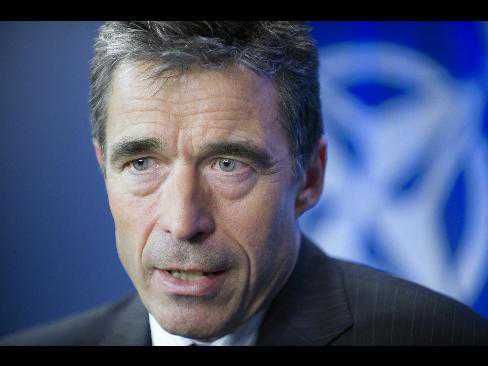By James G. Neuger
 Sept. 1 (Bloomberg) — NATO said it would consider a proposal by former U.S. National Security Adviser Zbigniew Brzezinski to tighten security arrangements with a Russian-led defense alliance to ease East-West tensions.
Sept. 1 (Bloomberg) — NATO said it would consider a proposal by former U.S. National Security Adviser Zbigniew Brzezinski to tighten security arrangements with a Russian-led defense alliance to ease East-West tensions.
NATO Secretary General Anders Fogh Rasmussen said he has an “open mind” toward ideas to soothe the strains between the former Cold War adversaries that peaked with Russia’s 2008 invasion of Georgia, a would-be NATO member.
“We have to look closer into the possibilities of improving confidence between Russia and NATO,” Rasmussen said in an interview at North Atlantic Treaty Organization headquarters in Brussels yesterday. “I am prepared to look upon all ideas that serve confidence-building with an open mind.”
Western governments are courting Russian help in securing supply lines for the 100,000 allied troops in Afghanistan, stemming the spread of nuclear weapons and in combating piracy off the coast of Somalia.
Writing in the current issue of Foreign Affairs magazine, Brzezinski called for a pact with the Russian-led Collective Security Treaty Organization, a seven-nation group cobbled together out of the remnants of the Soviet Union.
Such an agreement would go beyond the periodic high-level NATO-Russia meetings that resumed in June after the 28-nation western alliance ended a diplomatic boycott to protest the Georgia invasion.
Brzezinski, who served under President Jimmy Carter from 1977 to 1981, wrote of a need “to consolidate security in Europe by drawing Russia into a closer political and military association with the Euro-Atlantic community and to engage Russia in a wider web of global security that indirectly facilitates the fading of Russia’s lingering imperial ambitions.”
‘Strategic Partnership’
Rasmussen urged a “strategic partnership” with Russia to ward off common threats such as terrorism.
NATO-Russia ties were strained by Bush administration plans for a missile-defense system in eastern Europe and efforts to offer alliance membership to Ukraine and Georgia, two former Soviet republics.
Relations broke down completely when Russia rolled over Georgia’s army in a five-day war to reestablish its sphere of influence. Russia later granted diplomatic recognition to two territories, South Ossetia and Abkhazia, which declared independence and established military outposts in them.
President Barack Obama set out to “reset” relations with the Kremlin, heralding an East-West thaw.
Russian and NATO foreign ministers held their first post- Georgia-war meeting in Greece in June, agreeing to resume military-to-military cooperation.
Rasmussen, 56, a former Danish prime minister who became alliance chief Aug. 1, said he had not yet read Brzezinski’s proposals and stressed that any outreach to Russia would not undermine NATO’s role as the bedrock of trans-Atlantic security.
“The cornerstone of Euro-Atlantic security will still be NATO,” Rasmussen said.
To contact the reporter on this story: James G. Neuger in Brussels [email protected]
Source: www.bloomberg.com, August 31, 2009
